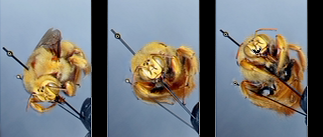
Bee Library
An online resource connecting images, specimen records, and natural history information about bees.
Dataset: All Collections
Taxa: Halictus ligatus (Halictus texanus, Halictus armaticeps, Halictus ornatipes, Halictus townsendi)
Search Criteria: United States; California; Santa Barbara; Coal Oil; includes cultivated/captive occurrences
1
Page 1, records 1-7 of 7
1
Page 1, records 1-7 of 7
Google Map
Google Maps is a web mapping service provided by Google that features a map that users can pan (by dragging the mouse) and zoom (by using the mouse wheel). Collection points are displayed as colored markers that when clicked on, displays the full information for that collection. When multiple species are queried (separated by semi-colons), different colored markers denote each individual species.



